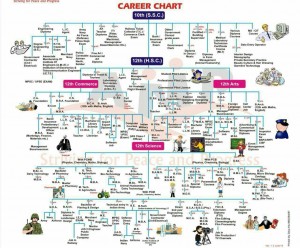National Defence Academy:
To join National Defense Academy a candidate must appear in the entrance exam conducted by Union Public Service Commission, New Delhi, twice a year. The Union Public Service Commission is solely responsible for issuing guidelines for selection and the final conduct of the entrance examination. Minimum Educational Qualification is 12th Class pass in 10+2 Pattern.
Age Limit:
| Age-Limits |
16-1/2 – 19 years |
Examination Paper:
There will be 2 papers in NDA (National defence academy) and National Academy (NA) written exam. The papers in all the subjects will consist of objective type questions only. The question papers of Mathematics & Part B of General Ability Test will be set bilingually in Hindi as well as English. Time duration for each paper is 2 ½ Hours . Subjects & Maximum Marks details mentioned below.
| S. No |
Subjects |
Time Duration |
Maximum Marks |
| 1 |
Mathematics |
2 ½ Hours |
300 |
| 2 |
General Ability Test |
2 ½ Hours |
600 |
|
Total |
900 |
| SSB Test/ Interview |
|
900 |
Interview:
Qualified candidates in the written examination will be called for Interview conducted by SSB (Services selection board).
For Army, Navy Wings & 10 +2 Entry Scheme candidates need to undergo Intelligence Test & Personality Test, but for Air Force Wing the candidates must attend a Pilot Aptitude Test. The Interview Consists both Intelligence & Personality Test.
Intelligence and Personality Test:
The SSB procedure consists of two stage Selection process-stage I and stage II. Only those candidates who clear the stage I are permitted to appear for stage II.
The details are :
a. Stage I comprises of Officer Intelligence Rating (OIR) tests are Picture Perception Description Test (PP&DT). The candidates will be shortlisted based on combination of performance in QIR Test and PP and DT.
b. Stage II Comprises of Interview, Group Testing Officer Tasks, Psychology Tests and the Conference. These tests are conducted over 4 days.
The personality of a candidate is assessed by three different assessors viz. the Interviewing Officer (IO), Group Testing Officer (GTO)and the Psychologist. There are no separate weight-age for each test. The marks are allotted by assessors only after taking into consideration the performance of the candidate holistically in all the test. In addition, marks for Conference are also allotted based on the initial performance of the candidate in the three techniques and decision of the Board. All these have equal weight-age. The various tests of IO, GTO and Psych are designed to bring out the presence/ absence of Officer like Qualities and their train-ability in a candidate. Accordingly candidates are Recommended or Not Recommended at the SSB.
N.B: Air force given pilot aptitude test only once for the candidate’s .The test selected candidates will go to every subsequent Interview.
How to apply for NDA Upsc exam:
Candidates are required to apply online by using the website www.upsconline.nic.in
E-Admit Cards:
The eligible candidates shall be issued an e-Admit Card three weeks before the commencement of the examination. The e-Admit Card will be made available on the UPSC website (www.upsc.gov.in) for being downloaded by candidates. No Admit Card will be sent by post. All the applicants are required to provide valid & active e-mail i.d. while filling up online application form as the Commission may use electronic mode for contacting them.
After Selection at the National Defence Academy, Pune
The selected candidates for the three services, viz, Army, Navy and Airforce are given preliminary training in both academic and physical for a period of 3 Years at the National Defence Academy which is an Inter-Service Institution. The training during the first two and half years is common to the cadets of three wings. The cadets on passing out will be awarded B.Sc./B.Sc.(Computer)/BA. Degree from Jawaharlal Nehru University, Delhi.
On passing out from the National Defence Academy:
- Army Cadets go to the Indian Military Academy, Dehradun,
- Navel Cadets to Indian Naval Academy Ezhimala and
- Air force cadets to Air Force Academy, Hyderabad.
At IMA
At the I.M.A Army Cadets are known as Gentlemen Cadets and are given strenuous military training for a period of one year. On successful completion of training Gentlemen Cadets are granted Permanent Commission in the rank of Lieutenant subject to being medically fit in “SHAPE-I” one.
At Indian Naval Academy
The Naval cadets are selected for the Executive Branch of the Navy, on passing out from the National Defence Academy and are given further training at Indian Naval Academy, Ezhimala for a period of one year on successful completion of which they are promoted to the rank of Sub Lieutenants.
At Air Force Academy
Air Force Cadets receive flying training for a period of 1½ years. However, at the end of 1 year of training they are given provisional Commission in the rank of Flying Officer. After successful completion of further training of six months they are absorbed as permanent commissioned officers on probation for a period of one year.
Gentlemen Cadets during the entire duration of training in Service Academies i.e. during training period at IMA shall be entitled to stipend of Rs 21,000/- p.m.
Apart from providing graduation degrees, NDA has the finest infrastructure for professional training. You’ll find phenomenal opportunities to develop your personality and cultivate new interests.
There are 31 extra-curricular activities to choose from. You haveaero-modeling, golf, gliding, sailing, wind surfing, astronomy, photography andmany more. For more details about NDA, visit NDA website http://www.nda.nic.in.
Sainik Schools:
- There are sainik schools and Army schools which prepares candidates for NDA.
- Check this out.
